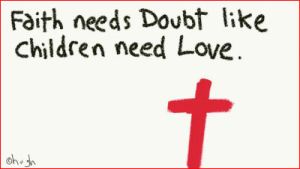Why Faith Needs Doubt
I read an article recently about an Ebola quarantine center in Liberia that was looted – for many reasons, I’m sure – but among them was that the mob truly believed that Ebola doesn’t exist, and is a Western hoax.
While I tried to wrap my head around how a large-ish group of people could deny the presence of a disease that has brought about the openly agonizing deaths of hundreds of their countrymen, I inevitably was reminded of myself, and how easily I (and we all) can believe totally or partially wrong things, even sometimes with the best intentions.
Over the past year or two, I have started to rethink faith (or belief – I’ll use the terms interchangeably). I don’t just mean as it applies to religion – people can have faith in themselves, in someone else, in an idea, in a technology, in whatever the mob around us is chanting… the list goes on. We all put faith in lots of different things. We can’t just not believe things – not a single one of us.
 For much of my life, I thought that faith and doubt were at odds with each other – one could strive up the mountain of faith, or slip back into the valley of doubt. Those who were able to muster up the most faith were the ones who were able to walk after doctors told them they couldn’t, or not flinch when being told to convert or die, or ignite movements that change the world. Certainly, faith can embolden us to do amazing things – so why would we ever want to water it down with doubt?
For much of my life, I thought that faith and doubt were at odds with each other – one could strive up the mountain of faith, or slip back into the valley of doubt. Those who were able to muster up the most faith were the ones who were able to walk after doctors told them they couldn’t, or not flinch when being told to convert or die, or ignite movements that change the world. Certainly, faith can embolden us to do amazing things – so why would we ever want to water it down with doubt?
I think the idea that doubt threatens faith comes from the belief (see how these tricky things pop up everywhere?) that they exist only as absolutes. If we believe it, we must believe it 100%; if we doubt it, we might as well doubt it 100%. If an accident victim is going to really, successfully believe that they can walk again, they need to tune out all doubt-inducing naysayers. Right?
 Here is another question: How many of us believe that a green light means we can go? The answer is all of us. We all believe a green light means we can go, which is why the guy behind us will lay on his horn if we fail to follow through on this universally held belief. Yet, a good driver will still exercise some caution before crossing the intersection, at least enough to keep an eye out for red light runners, pedestrians who aren’t paying attention, and anything else unexpected. This kind of caution is the same as doubt.
Here is another question: How many of us believe that a green light means we can go? The answer is all of us. We all believe a green light means we can go, which is why the guy behind us will lay on his horn if we fail to follow through on this universally held belief. Yet, a good driver will still exercise some caution before crossing the intersection, at least enough to keep an eye out for red light runners, pedestrians who aren’t paying attention, and anything else unexpected. This kind of caution is the same as doubt.
OK, it’s not a perfect analogy, but it’s important to realize that doubt doesn’t have to mean “unbelief”, or specifically believing something is not true. It’s just leaving a little bit of space to allow for the possibility that maybe – just maybe – we might want to take an enhanced view of our surroundings and reconsider. It’s like making plans, but being OK with the idea that the plans might need to change.
 Of course, leaving room for doubt or change can be more difficult than it sounds. I don’t know about you, but I find that I tend to be right about most things. After all, why would I believe them if they weren’t right? By contrast, other people around me tend to be right less often – so why would I doubt my probably-right beliefs because of their probably-wrong input? Surely these filthy masses will just taint my superior beliefs with their inane trickery!
Of course, leaving room for doubt or change can be more difficult than it sounds. I don’t know about you, but I find that I tend to be right about most things. After all, why would I believe them if they weren’t right? By contrast, other people around me tend to be right less often – so why would I doubt my probably-right beliefs because of their probably-wrong input? Surely these filthy masses will just taint my superior beliefs with their inane trickery!
This, at its core, is why faith needs doubt. Believing in something with unwavering zeal, the sort that leaves no room for doubt, makes us abysmally arrogant people. Being so convinced of our rightness that we refuse to even listen to anyone that doesn’t agree with us has this effect. Little good happens when we close the doors to our minds and ban any additional thoughts from entering.
So what about the accident victim believing they will walk again? In my experience, doubt (to a certain point) does not take away from faith at all; it makes faith stronger. Refusing to allow for doubt easily translates to fearing doubt, and ultimately makes a belief fragile. The belief must be carefully watched and guarded at all times, lest contradictory evidence mounts an attack. Realistically, the accident victim would probably be more motivated by the knowledge that failure is a very real possibility than by blindly believing that the doctor was 100% wrong in saying they will never walk again.
When we do allow room for our beliefs to encounter some doubt, a few things happen to our beliefs:
 1) They change. I’m being honest here – it’s pretty inevitable. When we truly allow for the possibility that our beliefs may need to change, and open ourselves up to questioning and evidence gathering, we may very well discover that we need to hit our brakes on a green light, or that in fact we will never fully walk again. But you know what? That’s OK. Repeat after me – it is OK. Life is a learning process, and beliefs, especially those we treasure the most, tend to change for the better.
1) They change. I’m being honest here – it’s pretty inevitable. When we truly allow for the possibility that our beliefs may need to change, and open ourselves up to questioning and evidence gathering, we may very well discover that we need to hit our brakes on a green light, or that in fact we will never fully walk again. But you know what? That’s OK. Repeat after me – it is OK. Life is a learning process, and beliefs, especially those we treasure the most, tend to change for the better.
2) They get resilient. I kind of talked about this one already, but it’s such a big one that I have to come back to it. Protecting our beliefs makes them weaker. Instead of testing our faith against the elements of this world, we’re testing the protective wall around our faith against the elements of this world. It’s an important difference.
By contrast, if we allow our beliefs to be poked and prodded, interrogated and maligned, what we invariably end up with are beliefs that we don’t have to worry about being poked and prodded and interrogated and maligned. I could write a whole other blog about the numerous effects of this kind of level of comfort.
3) They make us better people. That little “room-for-doubt space” I keep referring to has a very important quality to it: listening. When we allow for the possibility that we could be wrong, we therefore allow for the possibility that other people could be right. This makes their input more valuable, makes them feel more valued, and in turn makes us less of a jerk.
 Also, since we are all sometimes wrong (more often than we like to admit), listening to other people – people who don’t just affirm our current beliefs – can also save us from doing asinine things like looting an Ebola clinic and taking the diseased blankets into our homes; or running over a pedestrian crossing an intersection when they shouldn’t; and so on.
Also, since we are all sometimes wrong (more often than we like to admit), listening to other people – people who don’t just affirm our current beliefs – can also save us from doing asinine things like looting an Ebola clinic and taking the diseased blankets into our homes; or running over a pedestrian crossing an intersection when they shouldn’t; and so on.
Humans are tricky creatures, and they are way too capable of convincing themselves of things. This can apply to justifying their actions, or remembering things a certain way, or thinking that a placebo is medication, or that completely neutral people are against them, or just about anything really. Just because we believe it doesn’t make it true or real. Just because everyone around us also believes it still doesn’t make it true or real. We shake our heads at slave owners and Hitler supporters and Crusaders and Inquisitors… not that most beliefs lead to such extreme behavior, but they were all held by people every bit as rational and human as ourselves. Faith needs doubt because the people who hold that faith are imperfect – myself most of all.






As usual, not only very well thought out, also quite thought provoking. Faith and doubt are not counter-intuitive to each other, but more like a hand and glove because elements of each other.
Thank you, and great analogy! This is an idea I have been struggling with for quite some time, simply because it was so foreign to me. Glad you enjoyed!
Even in a religious sense, still hand and glove.
FYI: As an OITS fan, it will be returning soon.
Excellent!! Those posts must be quite a lot of work to put together… but your efforts are appreciated!
Excellent thoughts!
I’m currently writing a book on contentment, and I just tackled faith and doubt. My favourite disciple is Thomas, and we all know the abusive title he was given, as if such doubts are evil and should not be allowed. He was just seeking his own proof, and not the secondhand experience of others, and so his doubts were assuaged when Jesus came and showed him. His doubt was healthy since it ensured that HE knew what he could believe and not just accept what others said. This is vital for a healthy Christian life, and a truly close walk with our Lord.
I am also moved by the man who came seeking Jesus to heal his son, and said “I do believe! Help my unbelief!” His confession that he wanted to believe but hadn’t that full assurance for himself is disarming in its honesty; he was above pretending that he had 100% faith. For me, the opposite of faith is fear, and that includes the fear of doubting, but not doubt itself.
It’s interesting you mention Thomas – despite my feeling rather solidly about the importance of doubt, the verse (John 20:29) where Jesus essentially says Thomas was less blessed for doubting remains a big question mark for me. In a way, I like this, because it means I get to doubt my beliefs about doubt, which is such a beautiful logic-pretzel it should be art… Essentially, though, it serves as a reminder that I still haven’t got it all figured out.
“For me, the opposite of faith is fear, and that includes the fear of doubting, but not doubt itself” — I actually had to sit back and mull this one over for a while… and I love it! It actually makes many of the often-cited examples of Doubt Is Bad (Peter walking on water, the birth-story of Ishmael, even ‘Salvation’ itself) make far more sense. Doubt is primarily an intellectual experience, whilst Fear is primarily an emotional one.